London dispersion Study guides, Class notes & Summaries
Looking for the best study guides, study notes and summaries about London dispersion? On this page you'll find 265 study documents about London dispersion.
Page 2 out of 265 results
Sort by
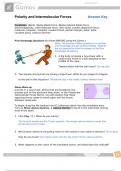
-
CHEM 1202 gizmos Student Exploration Polarity and Intermolecular Forces Answer Key
- Exam (elaborations) • 13 pages • 2023
- Available in package deal
-
- $9.99
- + learn more
Vocabulary: dipole, dipole-dipole force, dipole-induced dipole force, electronegativity, intermolecular force, ionic bond, London dispersion force, molecule, nonpolar, nonpolar covalent bond, partial charges, polar, polar covalent bond, valence electron Prior Knowledge Questions (Do these BEFORE using the Gizmo.)
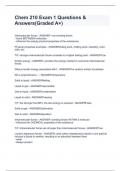
-
Chem 210 Exam 1 Questions & Answers(Graded A+)
- Exam (elaborations) • 10 pages • 2024
-
Available in package deal
-
- $9.99
- + learn more
Chem 210 Exam 1 Questions & Answers(Graded A+) Intermolecular forces - ANSWER- non bonding forces - found BETWEEN molecules - influence the energy physical properties of the substances Physical properties examples - ANSWERboiling point, melting point, solubility, color, odor, etc. T/F: stronger intermolecular forces correlate to a higher boiling point - ANSWERTrue Kinetic energy - ANSWER- provides the energy needed to overcome intermolecular forces What is kinetic energy ass...
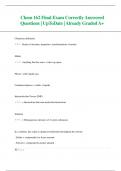
-
Chem 162 Final Exam Correctly Answered Questions| UpToDate | Already Graded A+
- Exam (elaborations) • 102 pages • 2024
-
- $14.49
- + learn more
Chemistry definition : Study of structure, properties, transformations of matter Matter : Anything that has mass + takes up space Phases: solid, liquid, gas Condensed phases = solids + liquids Intermolecular Forces (IMF) : = Interactions between molecules/atoms/ions Solution : = Homogenous mixtures of 2+ pure substances In a solution, the solute is dispersed uniformly throughout the solvent - Solute = compound(s) in lesser amount - Solvent = compound in greater amount 2 | P a g e E...
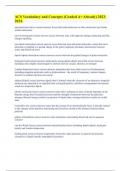
-
ACS Vocabulary and Concepts (Graded A+ Already) 2023-2024.
- Exam (elaborations) • 11 pages • 2023
-
- $11.49
- + learn more
intermolecular forces correct answers forces that hold molecules to other molecules (not bonds within molecules) ion-ion interaction correct answers occurs between ions, with opposite charges attracting and like charges repelling ion-dipole interaction correct answers occur between ions and polar molecules, where the ion is attracted or repelled to a partial charge in the polar molecules (includes interactions between water and dissolved ions) dipole-dipole interaction correct answers o...
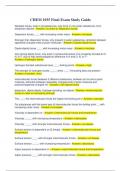
-
CHEM 1035 Final Exam Study Guide
- Exam (elaborations) • 14 pages • 2023
-
- $9.99
- + learn more
CHEM 1035 Final Exam Study Guide Weakest forces, exist in all substances, only force in non-polar substances, form temporary dipoles - Answer<>London or Dispersion forces Dispersion forces ____ with increasing molar mass - Answer<>increase Stronger than dispersion forces, only present in polar substances, attraction between oppositely charges ends of polar molecules - Answer<>Dipole-dipole forces Dipole-dipole forces ____ with increasing molar mass - Answer<>incre...
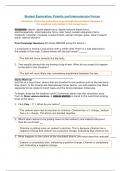
-
Student Exploration: Polarity and Intermolecular Forces Questions with Correct Answers
- Exam (elaborations) • 12 pages • 2023
- Available in package deal
-
- $10.49
- + learn more
Vocabulary: dipole, dipole-dipole force, dipole-induced dipole force, electronegativity, intermolecular force, ionic bond, London dispersion force, molecule, nonpolar, nonpolar covalent bond, partial charges, polar, polar covalent bond, valence electron Prior Knowledge Questions (Do these BEFORE using the Gizmo.) 1. A big bully is having a tug-of-war with a small child. There is a ball attached to the middle of the rope. Toward whom will the ball move?
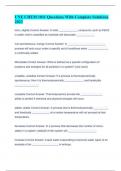
-
UNE CHEM 1011 General Chemistry II Midterm Fall Questions With Verified & Complete Solutions 2023
- Exam (elaborations) • 17 pages • 2023
-
Available in package deal
-
- $14.48
- + learn more
UNE CHEM 1011 General Chemistry II Midterm Fall Questions With Verified & Complete Solutions 2023 Intermolecular forces Correct Answer: the various forces of attraction that may exist between the atoms and molecules of a substance due to electrostatic phenomena Kinetic energies Correct Answer: the energy required to overcome the attractive forces and thus increase the distance between particles Intramolecular forces Correct Answer: within the molecule that keep the molecule together ...
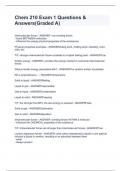
-
Chem 210 Exam 1 Questions & Answers(Graded A)
- Exam (elaborations) • 10 pages • 2024
- Available in package deal
-
- $19.49
- + learn more
Intermolecular forces - ANSWER- non bonding forces - found BETWEEN molecules - influence the energy physical properties of the substances Physical properties examples - ANSWERboiling point, melting point, solubility, color, odor, etc. T/F: stronger intermolecular forces correlate to a higher boiling point - ANSWERTrue Kinetic energy - ANSWER- provides the energy needed to overcome intermolecular forces What is kinetic energy associated with? - ANSWERThe random motion of particles...
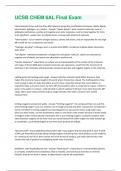
-
UCSB CHEM 6AL Final Exam Questions With 100% Correct Answers.
- Exam (elaborations) • 16 pages • 2024
- Available in package deal
-
- $8.49
- + learn more
Intermolecular forces and how they affect physical properties /purification techniques: dipole-dipole, electrostatic, hydrogen, ion, london, - Answer-*dipole-dipole*: polar covalent molecules such as aldehydes and ketones. positive and negative end. polar molecules must be close together for force to be significant. weaker than ion-dipole forces; increase with polarity of molecule. *electrostatic*: occur between charged species, cations and anions, and are responsible for very high MP and B...
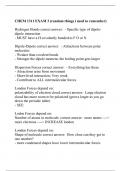
-
CHEM 1311 EXAM 3 (random things i need to remember)
- Exam (elaborations) • 3 pages • 2023
-
Available in package deal
-
- $9.99
- + learn more
Hydrogen Bonds correct answer: - Specific type of dipole-dipole interaction - MUST have a H covalently bonded to F O or N Dipole-Dipole correct answer: - Attractions between polar molecules - Weaker than covalent bonds - Stronger the dipole moment, the boiling point gets larger Dispersion Forces correct answer: - Everything has these - Attractions arise from movement - Short-lived interaction; Very weak - Contribute to ALL intermolecular forces London Forces depend on: ...



